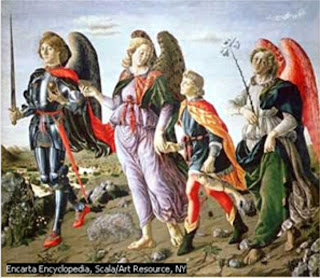Archangel, an angel, or heavenly being, of higher rank than angels. In Jewish and Christian literature, the four best known are Michael, Gabriel, Raphael, and Uriel. In Islam, it is believed that four archangels guard the throne of Allah. According to Christian tradition, archangels belong to the eighth of nine choirs of angels. Arranged according to their importance, in descending order, these choirs are seraphim, cherubim, thrones, dominations, virtues, powers, principalities, archangels, and angels.
GABRIEL
Gabriel, angel of high eminence in Jewish, Christian, and Muslim tradition. He is one of the four most often noted archangels in Judaism and Christianity, the others being Michael, Raphael, and Uriel. Gabriel is the heavenly messenger who appears in order to reveal God's will. In the Old Testament, Gabriel interprets the prophet's vision of the ram and the he-goat (see Daniel 8:15-26) and explains the prediction of the 70 weeks of years (or 490 years) for the duration of the exile from Jerusalem (see Daniel 9:21-27). In the New Testament, he announces to Zacharias the birth of Zacharias's son (see Luke 1:11-20), who is destined to become known as John the Baptist, and to Mary that she is to be the mother of Jesus Christ (see Luke 1:26-31). Among Muslims, Gabriel is believed to be the spirit who revealed the sacred writings to the Prophet Muhammad.
Gabriel is the prince of fire and the spirit who presides over thunder and the ripening of fruits. He is an accomplished linguist, having taught Joseph the 70 languages spoken at Babel. In art he is generally represented carrying either a lily, Mary's flower, at the annunciation, or the trumpet he will blow to announce the second coming.
MICHAEL
Michael (archangel), one of the seven archangels in Judaism, Christianity, and Islam, presumed to be leader of the angels (see Daniel 10:13, 21; 12:1) and guardian angel of Israel. His name derives from Hebrew words meaning “who is like God.” In Christian churches he is known as Saint Michael. According to a collection of apocalyptic writings known as the Book of Enoch, Michael and his command of faithful troops defeated the rebellious archangel Lucifer and his followers, casting them into Hell. In the Talmud, Michael’s relationship to the other angels is compared with that on Earth of the high priest to Israel; thus, he is considered the immediate lawgiver to the prophet Moses on Sinai (see Acts 7:38).
Michael has been known as the patron of the sick and of grocers, sailors, and soldiers; he is also the patron saint of Germany. In art he appears holding scales or a banner and flourishing a sword against a dragon. Beginning in 1970 Michael's feast day was combined with that of the archangels Gabriel and Raphael on September 29. See Michaelmas
Raphael (archangel) (Hebrew, “God hath healed”) one of the seven holy archangels. Raphael presides over the spirits of men in the afterlife (see Enoch 20:3). In the Book of Tobit in the Old Testament apocrypha, Raphael is described as the one who stands in the presence of God and presents the prayers of the saints before Him (see Tobit 12:15). In rabbinical literature he is the angel of healing.
RAPHAEL
Raphael (archangel) (Hebrew, “God hath healed”) one of the seven holy archangels. Raphael presides over the spirits of men in the afterlife (see Enoch 20:3). In the Book of Tobit in the Old Testament apocrypha, Raphael is described as the one who stands in the presence of God and presents the prayers of the saints before Him (see Tobit 12:15). In rabbinical literature he is the angel of healing.
URIEL
Uriel, one of the seven holy angels or archangels according to Jewish and Christian tradition. Translated from the Hebrew, Uriel means “God is my light.” In the Book of Enoch (chapter 20, verse 2), Uriel “is over the world and over Tartarus (the lowest region of the underworld).' In the same book it is said that God set Uriel over all the luminaries of the heaven (chapter 75, verse 3). In this capacity he served as guide for Enoch in his imaginary journeys through heaven and the underworld. Likewise, in 2 Esdras, Uriel instructs Esdras in the secrets of the universe.




